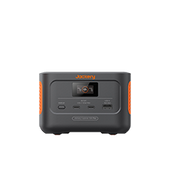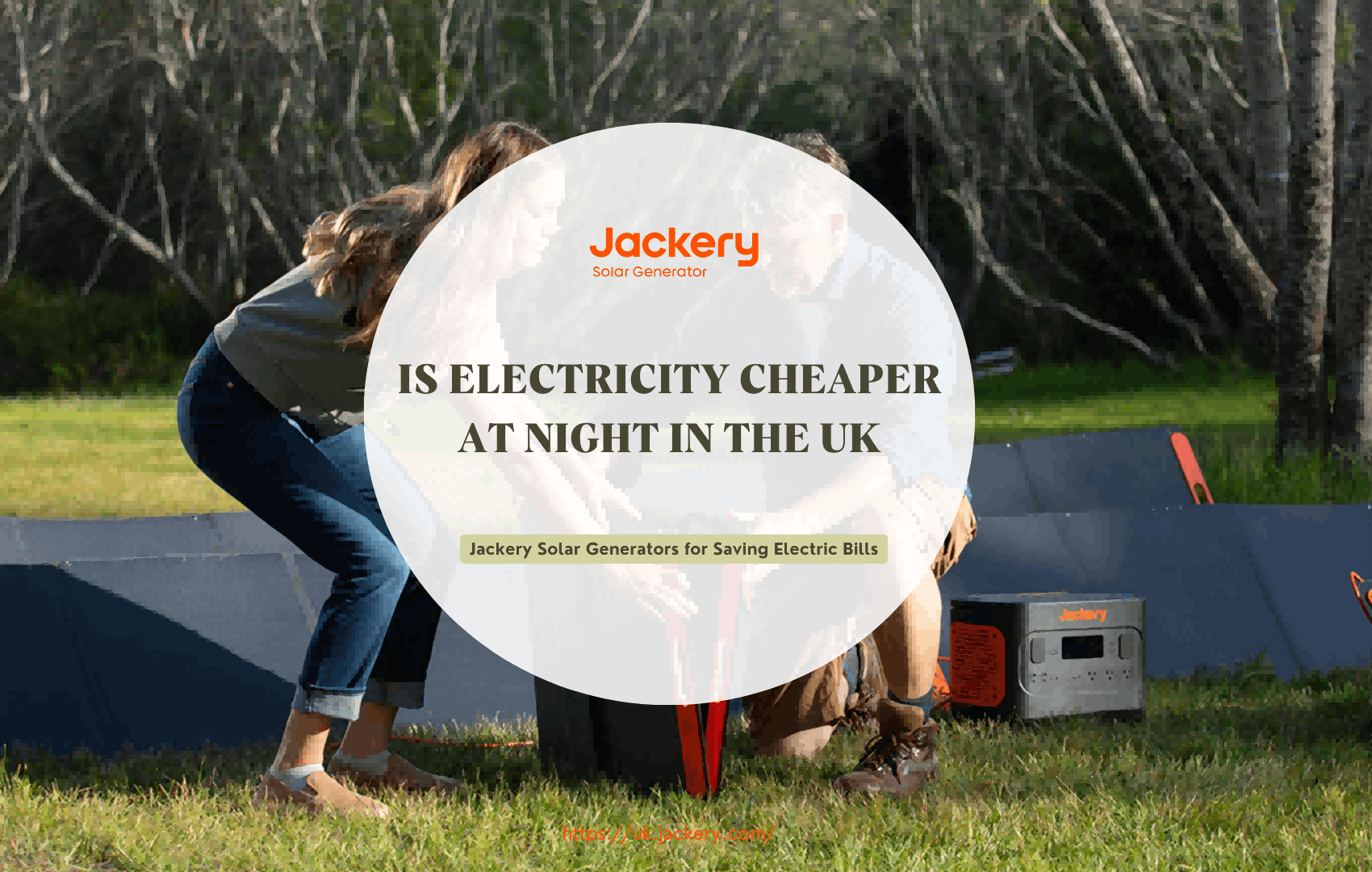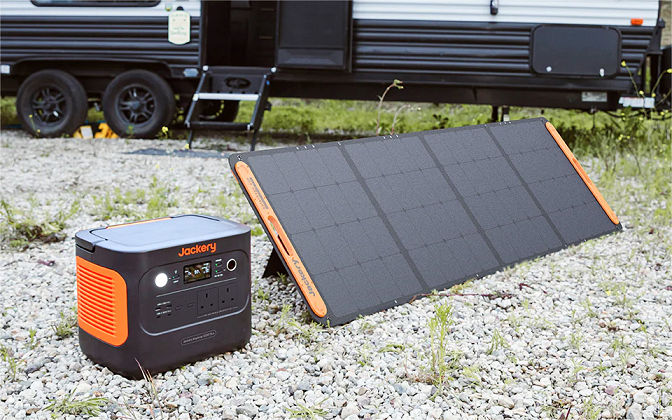Since prices started rising in 2022, many people in the UK have been worried about rising electricity bills.
So many people want to save money wherever they can but have questions, such as when is the best time to use electrical appliances? Is it cheaper to use electricity in the evening? Naturally, people are beginning to question whether they can reduce the electricity bills for their homes and businesses by using electricity later in the evening.
This guide will explain why electricity is cheaper at night, relative tariffs, and how to save more on electricity. Besides using electricity during off-peak hours, we highly recommend the Jackery Solar Generator, which is portable, powerful, and safe to use at home to save electric bills.
|
Key Takeaways: |
|
Homes using time-of-use electricity tariffs usually need dual-rate or smart meters, which can record your electricity consumption at different times of the day. It allows your electricity supplier to charge you cheaper rates during off-peak hours. Cheaper electricity at night is usually related to electricity consumption, peak load shifting, and power production. Off-peak electricity usage is when there is less electricity usage and lower demand on the grid, usually at night, weekends and holidays. We highly recommend Jackery Solar Generator 2000 Plus or 1000 Plus to save your electric bills with solar energy. |
When is The Cheaper To Use Electricity in The UK?
Electricity is integral to modern life, but many consider its cost expensive. With electricity prices set to remain high for the foreseeable future, it's essential to look at how to shift your electricity usage to cheaper times of day. So, when is electricity more affordable in the UK?
The fact is that whether electricity is cheaper in the UK depends entirely on the type of tariff you have (usually split into standard and dual-rate tariffs).
A standard tariff is a fixed rate, meaning that households pay the same price per unit of electricity no matter what time of day they use it. On a time-of-use tariff, electricity is cheapest during off-peak hours. For example, an Economy 10 tariff gives you the most affordable electricity for ten hours between 10 pm and 8 am the next day.
Generally, most UK households pay the same price for electricity over a 24-hour. However, if you have a time-of-use tariff, electricity will be cheapest during off-peak hours. (Off-peak hours are usually at night and on weekends.) However, the specific times when electricity is cheaper (off-peak hours) will vary from supplier to supplier, so be clear about the parameters of your contract.
Is Electricity Cheaper at Night in The UK?
Is electricity cheaper at night? For energy companies, it is more affordable to generate electricity at night. Since there is less demand for electricity at night, energy companies can offer lower rates for electricity consumption during this specific period. Usually, during this off-peak period, the grid is under less pressure and electricity is distributed more efficiently. Accordingly, electricity suppliers will reduce electricity prices.
But for electricity consumers, whether electricity is cheaper at night depends on the type of electricity tariff you are eligible for. So, if you choose a time-of-use tariff, you can enjoy cheaper electricity prices.
Because under the standard electricity tariff, your energy consumption will be charged at a fixed rate, so you will not want any savings due to night-time electricity consumption. Time-of-use electricity tariffs generally give you two different rates, namely the peak rate and the off-peak rate (off-peak hours are typically in the evening and at night), and the latter can be much cheaper.
Homes using time-of-use electricity tariffs usually need dual-rate or smart meters, which can record your electricity consumption at different times of the day. It allows your electricity supplier to charge you cheaper rates during off-peak hours. For many households, off-peak rates provide an opportunity to economically use energy-intensive appliances, which indirectly helps save money on electricity bills.
Therefore, many households using time-of-use electricity rates choose to schedule tasks such as charging home batteries, charging electric vehicles, washing dishes or laundry at night to effectively take advantage of these lower electricity prices.
Even more, households are investing in home battery storage systems to store cheaper electricity at night, which allows them to quickly achieve maximum savings without limiting their electricity needs to the time frame when electricity prices are lower.
Why Is Electricity Cheaper at Night?
The cheapest off-peak electricity times vary by supplier, location, and season. However, electricity is generally more expensive during peak daytime hours and cheaper late at night and early in the morning. So why is electricity cheaper at night than during the day? More affordable electricity at night is usually related to multiple factors, such as power consumption and power peak shifting.

Power Consumption
Electricity has a core characteristic: its production and consumption are balanced in real time. From the perspective of power consumption, during the day, due to large-scale industrial and commercial activities, the electricity demand is high, so the price of electricity during the day is naturally relatively higher.
At night, the primary electricity consumers turn to residents and some small-scale commercial activities. Hence, the electricity demand is relatively low, the electricity demand is relatively low, and the electricity supply is relatively abundant, so electricity is cheaper at night.
Power Peak Shifting
The power system needs to ensure a balance between supply and demand. Power outages may occur if the power system cannot meet market demand during peak power consumption. To avoid this situation, power companies will balance power demand through power peak shifting, and one manifestation of this is that electricity is cheaper at night than during the day.
Electricity Production
From the perspective of electricity production, power plants continue to generate electricity regardless of day or night, and most power plants generate almost the same amount of electricity during the day and at night. Therefore, many electricity suppliers encourage people to increase their electricity use to balance the excess electricity supply at night.
Peak and Off-Peak Electricity Rates in The UK
Peak and off-peak tariffs are different electricity prices depending on the time of day. Generally, the price of electricity during peak usage is the "peak price," and during off-peak usage, it is the "off-peak tariff."
So when are the peak and off-peak times for electricity? Peak electricity usage is the time of day and night when most people use electricity.
Off-peak electricity usage is when there is less electricity usage and lower demand on the grid, usually at night, weekends and holidays. Some electricity suppliers will offer consumers cheaper electricity during off-peak times. For example, it may cost 30p per unit of electricity used during the day and 20p per unit of electricity used at night.

Advantages and Disadvantages of Off-Peak Rates
What are the advantages of off-peak tariffs? Perhaps off-peak tariffs are so popular because using electricity during off-peak hours can significantly save costs. Of course, off-peak tariffs also have disadvantages. For example, to be economical, most of your electricity consumption should be done during off-peak hours (usually in the evening or at night), which is inconsistent with the daily habits of every household.
Advantages of Off-peak Rates:
- The cost per unit of electricity during off-peak hours will be lower than the standard electricity price or the electricity price during peak hours.
- Off-peak tariffs are tailored for night-time electricity users (such as electric vehicle users and night-time businesses).
- Off-peak tariffs essentially reduce the cost of running equipment at night.
- Off-peak tariffs relieve the pressure on the power grid and power plants to a certain extent.
- Households with renewable energy generation and battery systems can store more electricity cheaply.
Disadvantages of Off-peak Rates:
- Off-peak rates are likely to result in higher prices during peak hours.
- Off-peak rates often involve complex pricing structures that require careful monitoring.
- Contracts associated with off-peak rates may come with additional obligations, limiting the ability to switch suppliers or adapt to changing energy needs.
- Adjusting electricity usage to off-peak times is a hassle for many households.
Economy 7 and Economy 10
To get cheaper electricity, you need to choose off-peak or time-of-use tariffs. In the UK, many electricity suppliers offer Economy 7 and Economy 10 (also known as time-of-use tariffs), which have specific lower night-time rates (off-peak tariffs).
Economy 7
Economy 7 has two different tariffs: the daily tariff and the seven-hour off-peak tariff. It is called Economy 7 because there are seven hours of off-peak time.
For example, its off-peak tariff is usually between 12 pm and 7 am the following day, and the peak tariff is from 7 am to 12 pm. To enjoy Economy 7 tariffs, you must have a meter that can read electricity usage at different times (usually an Economy 7 meter or a smart meter).
Economy 10
The Economy 10 tariff is another plan that offers off-peak tariffs. It is named Economy 10 because it provides ten hours of off-peak tariffs. For example, its off-peak hours may be from 1 pm to 4 pm and 12 pm to 7 am.
So please note that when Economy 7 and Economy 10 enjoy off-peak tariffs, they will vary according to location, supplier, etc. Therefore, please contact the electricity supplier regarding the off-peak period or daytime charges.
Other Factors Affecting Electricity Bills
Whether you use electricity to boil water or watch TV, you use electricity everywhere. But if you understand the factors that affect your electricity bill, you can control your electricity consumption and bill.
Electricity Prices: Generally, the main factor that affects your electricity bill is the price of electricity. And the cost of electricity depends on the electricity plan and supplier you choose. Some electricity suppliers or plans offer a flat rate; that is, the price of electricity remains the same no matter what time of day it is.
However, for many consumers, using a time-of-use electricity rate that includes off-peak hours at night is cheaper. Whether the final electricity price is cheaper depends on the consumer's electricity usage pattern and the specific electricity rate they choose.
Electricity Consumption: Most of your electricity bill is determined by electricity consumption, so using more means your electricity bill will be higher. However, different households have different electricity consumption habits, which will affect their electricity bills differently. Of course, electricity consumption is mainly related to the use time, weather, and household size.
Time of Use: Using a time-of-use electricity rate, using electricity during off-peak hours is cheaper than during peak hours.
Weather Conditions: Hot weather conditions will cause energy-intensive air conditioners to be used more frequently, increasing electricity consumption. In cold weather conditions, homes usually need to be heated longer, which increases electricity consumption.
Household Size: Generally speaking, the more people living in a household, the higher the electricity bill. A more enormous household means more electrical appliances and electronic devices that consume electricity. Also, larger households use electrical appliances (such as washing machines, TVs, or game consoles) more frequently, which consumes more electricity.
How to Save Electric Bills with Off-Peak Electricity?
Using electricity can often be cheaper, and some energy suppliers are actively assisting their customers in taking advantage of off-peak rates, tariffs, or discounts by adjusting their electricity usage times. The following are the tips for saving electric bills with off-peak electricity.

Tip 1: Invest in Smart Home Technology
Smart home devices let you control your appliances from a distance. You can set them to operate during off-peak hours, even if you're not at home. Putting in a small investment now can lead to lower energy bills in the future. Smart thermostats help manage energy use by ensuring your home is only heated when necessary.
Tip 2: Consider Off-Peak Electricity Tariffs
Your energy provider might have time-of-use tariffs and lower rates for electricity at night. For instance:
Electric vehicle tariffs. If you own an electric vehicle, use the lower off-peak electricity rates available at night. You can use the cheaper night-time electricity for anything, including running high-energy appliances like the washing machine and dishwasher or charging your smartphones, laptops, and tablets simultaneously. Explore Electric Vehicle tariff for lower off-peak electricity rates daily from 12 am to 5 am.
Your savings estimate is now available. The new EV tariff savings calculator shows how much you can save on EV charging costs compared to your current electricity rates per charge and annually. It compares your estimated EV charging costs with our EV tariff and the costs at public chargers. You will learn the estimated reduction in CO2 emissions compared to a traditional petrol vehicle.
Tip 3: Use Your Electricity in Off-Peak Hours
Reduce electricity bills by moving energy-heavy tasks such as batch cooking, laundry, or charging devices to off-peak hours. Some suppliers provide lower rates or discounts for using electricity during off-peak hours.
If you have a smart meter with British Gas, consider joining the many customers who have signed up for PeakSave. You can earn credit on your bills by adjusting your electricity usage times.
Tip 4: Shift to Renewable Energy
Installing and using solar energy to replace some of the grid's functions can help reduce your electricity bill. For example, a solar generator can replace the grid to a certain extent and power home appliances, lights, or technical equipment. In addition, excess electricity can be stored in solar cells for use at night or when needed.
Solar generators, like Jackery Solar Generators, give your home a renewable way to reduce dependence on the power grid. Investing in a good solar generator ensures you can harvest and store enough solar energy to reduce electricity consumption significantly.
Jackery Solar Generators for Saving Electric Bills
Electricity is cheaper at night, as explained above because you use it during off-peak hours. Apart from choosing the proper time to use electricity, you can invest in a solar generator to save money using unlimited and green solar energy.
Jackery Solar Generators are comprised of SolarSaga Solar Panels for solar energy capture and Explorer Portable Power Stations for energy storage for further utilisation. Also, you can recharge portable power stations by wall outlets or carport, which means you can use the off-peak electricity to refuel your power station for later use. The generator can power multiple appliances, such as refrigerators, TVs, lights, etc. Here, we recommend Jackery Solar Generator 2000 Plus and 1000 Plus.

Jackery Solar Generator 2000 Plus
Jackery has introduced the Solar Generator 2000 Plus, a solid portable power solution that delivers outstanding performance. With its impressive capacity and powerful output, this device can support the operation of typical household appliances for weeks, which is best for saving kWh usage in your house.

- Expandable Powerhouse for Your Appliances: The Jackery Solar Generator 2000 Plus enables the addition of extra battery packs, increasing the capacity from 2 kWhto an impressive 12 kWh, thereby significantly improving the solar charging capabilities. This solar product has a remarkable output of 3000W, providing a 30% higher rated power than other 2 kWh solar products. Almost all necessary household appliances are powered.
- Higher Resistance & Reliability: The Explorer 2000 Plus stands out as a groundbreaking add-on battery pack that offers the convenience of recharging through solar panels. This feature increases versatility, boosts charging efficiency, and shortens charging time.
- Safe to Use with ChargeShield: ChargeShield is Jackery's advanced fast charge technology, featuring 62protective mechanisms, 12 protective algorithms, and four types of physical safety protection. This technology uses a unique stepped variable-speed charging algorithm to enhance safety and extend battery pack lifespan by 50%.
|
*Review from Our User |
|
I bought Solar Generator 2000 Plus to ensure I had a reliable solution for video field production during a long power outage, allowing everything to run smoothly for an extended time. The Solar Generator 2000 Plus is anticipated to provide power to my 5-camera setup for around six hours, which should meet the needs of any practical emergency. |
Jackery Solar Generator 1000 Plus
Jackery Solar Generator 1000 Plus combines SolarSaga 100W solar panels with Explorer 1000 Plus. We will introduce the two components respectively. If Jackery Solar Generator 2000 Plus is for charging your appliances for a few weeks, this solar generator is for charging for several days.

- Excellent Power Output: The Explorer 1000 Plus power station boasts an excellent 1264Wh long-lasting LiFePO4 battery and a 2000W full-power pure sine wave inverter, supplying almost all required power. Adding up to three additional battery packs will remarkably increase its capacity to 5kWh.
- Expandable Powerhouse: Adding up to three extra battery packs lets Jackery's exclusive technology boost the Explorer 1000 Plus capacity from 26kWh to5kWh. Moreover, it has a maximum output of 2000W, 20% more than usual 1kWh LFP generators.
- Higher Solar Conversion Rate: The Jackery SolarSaga 100W Solar Panel boasts a solar conversion rate of up to 25%; it is optimally designed for outdoor use and unforeseen power interruptions. The solar panel weighs about 8 lbs, is lightweight, foldable, and equipped with a convenient carry handle, enhancing its portability.
|
*Review from Our User |
|
This Solar Generator 1000 Plus is sturdy and fits perfectly in my workspace, as shown in the picture. A power outage can truly alter the situation. I can carry on with my tasks as though everything is perfectly fine, which is remarkable. What stands out as the most beneficial feature for me? The USB-C connections. I can connect my Mac directly to it; no adapter is required. This is extremely helpful! |
Electricity Cheaper at Night FAQs
The following are the frequently asked questions about the electricity cheaper at night in the UK:
- How do you determine if you are eligible for off-peak tariffs?
If you want to enjoy off-peak tariffs in the UK, you must have a smart meter. In addition, most electricity suppliers in the UK offer time-of-use electricity prices that include off-peak tariffs.
To determine your eligibility for off-peak tariffs, go to the corresponding electricity supplier's website to check the relevant information. The following are some of the electricity suppliers in the UK that offer off-peak tariffs:
|
Octopus |
Good Energy |
|
100Green |
EON |
|
British Gas |
EDF |
|
OVO |
Scottish Power |
|
Ecotricity |
|
- Is it cheaper to do laundry at night if you have off-peak electricity rates?
Washing clothes is one of the most energy-intensive activities in the home, especially when using a tumble dryer. If you already have off-peak electricity rates, you can use your washing machine during off-peak times (usually evenings and overnight) to benefit from cheaper electricity prices.
The cheapest time to use your washing machine is usually during off-peak times, evenings or weekends, generally between 10 pm and 8 am. In addition, you can use a timer to control the time you use your washing machine to avoid safety hazards.
- When are off-peak hours?
Off-peak hours are generally when electricity demand is lower. However, the exact time of off-peak hours may vary depending on the electricity provider. Check with your electricity provider if you want to know the exact off-peak hours.
- How to take advantage of off-peak tariffs?
You can avoid using high-energy appliances such as ovens, dishwashers and washing machines during peak hours. Instead, you can shift your electricity consumption to off-peak hours as much as possible to take advantage of cheaper off-peak tariffs. Besides, you can choose appliances with timers to start and use during off-peak hours without sacrificing sleep time.
Final Thoughts
With electricity prices set to remain high for the foreseeable future, it's worth considering shifting your electricity usage to cheaper times. While off-peak tariffs are generally cheaper at night, the extent of the savings depends on your location, your electricity usage habits, and your electricity supplier's pricing structure. In summary, understanding electricity prices in the UK, particularly peak and off-peak tariffs, can help you manage your electricity costs effectively.







































































































